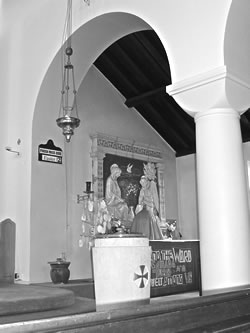 “Go therefore and make disciples of all nations, baptising them in the name of the Father and of the Son and of the Holy Spirit and teaching them to obey everything I have commanded you. And remember, I am with you always, to the end of the age”
“Go therefore and make disciples of all nations, baptising them in the name of the Father and of the Son and of the Holy Spirit and teaching them to obey everything I have commanded you. And remember, I am with you always, to the end of the age”
(Matthew 28:19).
These last words of Christ, which close Matthew’s gospel, give the disciples a commission – nothing less than to inaugurate a new age, build a new creation, founded on Christ and his teaching. Baptism will be the foundation of this new creation and a lasting mark that we belong to Christ.
Given the significance of baptism it is odd that we do not reflect more on our own baptism – and its implications - more than we do. However, it isn’t always easy. Part of the problem, I suspect, is that many of us, having been baptised as babies, have no recollection of our baptism and so our baptism is, for us, a thing of the past (and for some of us, the distant past). Our baptism is something others celebrated, others enjoyed. We may have been at the party but we did not join in the feast. All that may now remain of the first step in our Christian journey are a few fading photographs. I hope that the thoughts below on what baptism means may help all of us to reflect again on our calling – and our eternal destination.
Practically, baptism is a simple sacrament. Water and one sentence - “N, I baptise you in the name of the Father, Son and Holy Spirit” ( In the churches of the East a passive form of this statement is used, i.e., “You are baptised in the name and etc…”) – are all that is required. One doesn’t even need a priest; anyone can baptise in an emergency (even a non-Christian if they have the intention to do as the Church does). Yet this seemingly simple ceremony is rich in theological significance. What, then, is accomplished in baptism?
First, our sins are forgiven. Not only individual acts but what the Church used to call “original sin”. People find this concept difficult – and there is a lively debate on whether it is useful any more. But one simple way of understanding what it means is that, as humans, we are all at a distance from God. We are born in a world, which though perfect in conception, is fallen through creation. Baptism brings with it a new creation; we are “born again” as children of God and become what God always intended us to be – sharers of his life, his friends. Water is the effective symbol of cleansing and new life.
Second, baptism makes us members of the Church. The Church differs from any human society in that its one foundation (as the famous hymn put it) is Jesus Christ. In being baptised we share in a unique way in Jesus’s life and death. Through the sacrament we die with him to our own life and rise to new life as part of his body, the Church.
Thirdly, baptism is performed only once. Why? Because it marks us with the sign of Christ (known often as “baptismal character”) and this sign can never be removed. Once Christ claims us as his, he never relinquishes that claim. So, as with the one lost sheep which the shepherd searches for until it is found, we may stray far from Christ but he will never abandon us. In baptism he has placed his mark on us – and we are his.
So, if there is one aspect of baptism which we might remember when we bless ourselves before Mass it might be this: baptism gives to each one of us, no matter our origin, a unique dignity which we cannot lose. And Christ, having claimed us for his own, will be faithful to the end.